| Srl | Item |
| 1 |
ID:
130626
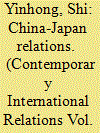

|
|
|
| 2 |
ID:
098662
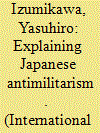

|
|
|
|
|
| Publication |
2010.
|
| Summary/Abstract |
Since the late 1990s, Japan has sent increasing numbers of its military forces overseas. It has also assumed a more active military role in the U.S.-Japan alliance. Neither conventional constructivist nor realist approaches in international relations theory can adequately explain these changes or, more generally, changes in Japan's security policy since the end of World War II. Instead, Japan's postwar security policy has been driven by the country's powerful antimilitarism, which reflects the following normative and realist factors: pacifism, antitraditionalism, and fear of entrapment. An understanding of the influence of these three factors makes it possible to explain both Japan's past reluctance to play a military role overseas and its increasing activism over the last decade. Four case studies-the revision of the U.S.-Japan Security Treaty in 1960, the anti-Vietnam War period, increases in U.S.-Japan military cooperation during détente, and actions taken during the administration of Junichiro Koizumi to enhance Japan's security profile-illustrate the role of antimilitarism in Japan's security policy. Only through a theoretical approach based on analytical eclecticism-a research strategy that considers factors from different paradigms-can scholars explain specific puzzles in international politics.
|
|
|
|
|
|
|
|
|
|
|
|
|
|
|
|
| 3 |
ID:
117037
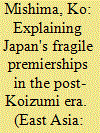

|
|
|
|
|
| Publication |
2012.
|
| Summary/Abstract |
After Prime Minister Junichiro Koizumi's highly successful rule, Japan saw the five short-lived premierships - Shinzo Abe, Yasuo Fukuda, Taro Aso, Yukio Hatoyama, and Naoto Kan - over the period of five years (2006-11). This article aims to identify the causes of this unusually high frequency of Japan's leadership changes in recent times. Specifically, it finds that all post-Koizumi prime ministers lost power after a short tenure by following the same pattern of demise that was characterized by a rapid fall of approval rate in the media's polls. It argues that they fell into this pattern of failure for the same three reasons: their failure in economic policy; their poor leadership ability derived from the vanishing of the traditional career path to premiership; their unstable intraparty foothold caused by the transition from candidate-centered election to party-centered election. It argues that the politics under the Koizumi and post-Koizumi cabinets share important undercurrents despite their apparent differences.
|
|
|
|
|
|
|
|
|
|
|
|
|
|
|
|
| 4 |
ID:
130620


|
|
|
| 5 |
ID:
100002
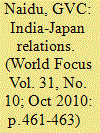

|
|
|
| 6 |
ID:
086461


|
|
|
|
|
| Publication |
2008.
|
| Summary/Abstract |
Although Margaret Keck and Kathryn Sikkink formulated the concept of a transnational advocacy network (TAN) as a tight-knit community of transnational nongovernmental individuals with shared beliefs and identities, they did not go on to trace the dynamics of the development of such a network. This paper claims that "shared values" is an insufficient explanation for network-building. It further expands on the analytical framework for the development of a TAN by discussing the following three main themes: (1) the political opportunity that catalyzes the emergence of the activists; (2) the network "glue" that facilitates cohesion and closeness in the TAN; and (3) the network organization that defines the participation and problems related to role distribution with respect to the activists in the TAN. This study examines the case of the anti-Yasukuni TAN comprising activists from Taiwan, South Korea, and Japan, and finds that the TAN was transformed in terms of its function and strategy as activists of different national origins joined it. From the evidence gleaned from structured interviews, it was found that activists from Taiwan instilled the TAN with a revolutionary character that facilitated the mobilization of wider social support. Ambitious activists from South Korea then added a greater international dimension to the TAN. Although the groups from Taiwan and South Korea tended to accelerate the development of the TAN and diversify it, the Japanese group reminded the developing TAN of its original target. Thus, a TAN is a far more complex entity with a mixture of multinational and cultural attributes rather than a simple and steady network formed by transnational actors with shared beliefs, as Keck and Sikkink have posited.
|
|
|
|
|
|
|
|
|
|
|
|
|
|
|
|
| 7 |
ID:
119292
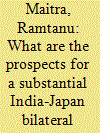

|
|
|